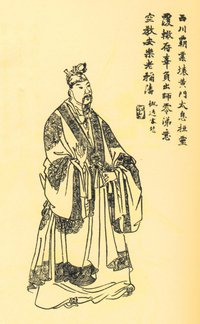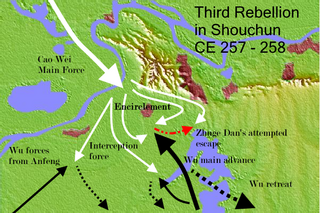Cao Fang (232–274), courtesy name Lanqing, was the third emperor of the state of Cao Wei during the Three Kingdoms period. He was an adopted son of Cao Rui, the second ruler of Wei. Cao Fang ruled from January 239 to October 254 as a nominal emperor before he was deposed by the regent Sima Shi, after which he became known as the "Prince of Qi". After the fall of Wei in February 266, Cao Fang was conferred the title of "Duke of Shaoling" by Emperor Wu of the Jin dynasty. When he died in 274, he was granted the posthumous name "Li", so his full posthumous title became "Duke Li of Shaoling".
Cao Mao, courtesy name Yanshi, was the fourth emperor of the state of Cao Wei during the Three Kingdoms period of China. He was a grandson of Cao Pi, the first emperor of Wei. Described as intelligent and studious, Cao Mao made repeated attempts to seize back state power from the regent Sima Zhao but failed. He was killed in an abortive coup d'état against Sima Zhao.

Liu Shan, courtesy name Gongsi, was the second and last emperor of the state of Shu Han during the Three Kingdoms period. As he ascended the throne at the age of 16, Liu Shan was entrusted to the care of the Chancellor Zhuge Liang and Imperial Secretariat Li Yan. His reign of 40 years was the longest of all emperors in the Three Kingdoms era. During Liu Shan's reign, many campaigns were led against the rival state of Cao Wei, primarily by Zhuge Liang and his successor Jiang Wei, but to little avail, due to their drastic mismatch in terms of population and geographic extent. Liu Shan eventually surrendered to Wei in 263 after Deng Ai led a surprise attack on the Shu capital Chengdu. He was quickly relocated to the Wei capital at Luoyang, and enfeoffed as "Duke Anle". There he enjoyed his last years peacefully before dying in 271, most probably of natural causes.
Cao Ang, courtesy name Zixiu, was the eldest son of Cao Cao, a warlord who rose to power towards the end of the Han dynasty and laid the foundation of the state of Cao Wei in the Three Kingdoms period of China. He was killed at the Battle of Wancheng in 197.

Sima Shi, courtesy name Ziyuan, was a military general and regent of Cao Wei during the Three Kingdoms period of China. In 249, he assisted his father Sima Yi in overthrowing the emperor Cao Fang's regent Cao Shuang, allowing the Sima family to become paramount authority in the state, and he inherited his father's authority after his father's death in 251. He maintained a tight grip on the political scene and, when the emperor, Cao Fang, considered action against him in 254, had him deposed and replaced with his cousin, Cao Mao. This tight grip eventually allowed him to, at the time of his death in 255 after just having quelled a rebellion, transition his power to his younger brother, Sima Zhao, whose son Sima Yan eventually usurped the throne and established the Jin dynasty.

Meng Da, courtesy name Zidu, was a military general of the state of Cao Wei during the early Three Kingdoms period of China. He previously served the warlords Liu Zhang and Liu Bei during the late Eastern Han dynasty before defecting to Wei. In Wei, he served under the first two rulers, Cao Pi and Cao Rui. Around late 227, he started a rebellion in Wei and aimed to rejoin the Shu-Han but the revolt was swiftly suppressed by the Wei general Sima Yi. Meng Da was captured and executed for treason.
Empress Zhang, personal name unknown, was an empress of Cao Wei during the Three Kingdoms period of China. She was the second wife of Cao Fang, the third emperor of Cao Wei.
Jia Chong, courtesy name Gonglü, was a Chinese politician who lived during the late Three Kingdoms period and early Jin dynasty of China. He started his career as an advisor to Sima Shi and Sima Zhao, the regents of the state of Cao Wei in the Three Kingdoms era, and subsequently served as an official in the court of Sima Zhao's son, Sima Yan, after the establishment of the Jin dynasty.
Wang Su (195–256), courtesy name Ziyong, was an official and Confucian scholar of the state of Cao Wei during the Three Kingdoms period of China. He was a son of Wang Lang. When Guanqiu Jian started a rebellion in Shouchun, Wang Su advised Sima Shi to lower the rebels' morale by treating their families with respect. Following that, Wang Su entreated Cao Mao to allow Sima Zhao to succeed Sima Shi as regent of Wei.
Xiahou Xuan, courtesy name Taichu, was a Chinese essayist, historian, military general, philosopher, and politician of the state of Cao Wei during the Three Kingdoms period of China.
Guanqiu Jian, courtesy name Zhonggong, was a Chinese military general and politician of the state of Cao Wei during the Three Kingdoms period of China.
Wen Qin, courtesy name Zhongruo, was a Chinese military general and politician of the state of Cao Wei during the Three Kingdoms period of China.
Fu Gu (209–255), courtesy name Lanshi, was an official of the state of Cao Wei during the Three Kingdoms period of China.
Sima You, courtesy name Dayou, was an imperial prince of the Western Jin dynasty of China. He was the second son of Sima Zhao, a regent of the Cao Wei state during the Three Kingdoms period, and Zhao's wife Wang Yuanji. His wife was a daughter of Jia Chong and Jia's first wife Li Wan; Li Wan herself was a daughter of Li Feng.

Romance of the Three Kingdoms is a Chinese television series adapted from the classical 14th century novel of the same title by Luo Guanzhong. The series was produced by China Central Television (CCTV) and was first aired on the network in 1994. It spanned a total of 84 episodes, each approximately 45 minutes long. One of the most expensive television series produced at the time, the project cost 170 million yuan. It was completed over four years and involved over 400,000 cast and crew members, including divisions of the People's Liberation Army from the Beijing, Nanjing and Chengdu military regions. Some of the dialogue spoken by characters was adapted directly from the novel. Extensive battle scenes, such as the battles of Guandu, Red Cliffs and Xiaoting, were also live-acted.

Zhuge Dan's Rebellion, or the Third Rebellion in Shouchun, was a revolt led by Zhuge Dan, a general from the state of Cao Wei, against the regent Sima Zhao. Zhuge Dan received some support from Eastern Wu, Cao Wei's rival state. It was the third and final of a series of three rebellions that took place in Shouchun in the 250s during the Three Kingdoms period of China.
Li Sheng, courtesy name Gongzhao, was a Chinese politician of the state Cao Wei in the Three Kingdoms period of China.
This article contains the family trees of members of the Cao clan, who ruled the state of Cao Wei (220–265) in the Three Kingdoms period (220–280) in China. Only Cao Cao's lineage is shown in this article. The lineages of his relatives, such as Cao Ren, Cao Zhen and others, are not included here.

The Advisors Alliance is a 2017 Chinese two-part television series based on the life of Sima Yi, a government official and military general who lived in the late Eastern Han dynasty and Three Kingdoms period of China. The series starred Wu Xiubo as the main character, with Liu Tao, Li Chen, Janine Chang, Tang Yixin, Yu Hewei and Wang Luoyong playing supporting roles. The first part of the series started airing on Jiangsu TV and Anhui TV on 22 June 2017. The second part started airing on Youku on 8 December 2017.





